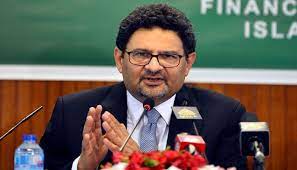Islamabad August 14 2022: We are not in a position to give any taxation relief to stock market investors in current economic situation says Pakistan’s Finance Minister Miftah Ismail.
He said this while speaking to the private news channel here in Islamabad on today 14th August 2022.
Earlier on 9th August PSX members met with Finance Minister in a follow-up meeting on the heels of the visit of the Finance Minister to PSX on Friday 5th August 2022.
In the meeting, the MD PSX re-emphasized that the situation in the capital markets needed to be addressed on a war-footing.
The key points addressed at the meeting included matters related to Pakistan’s macro-economy, capital markets, taxation and non-tax measures.
In terms of the macroeconomic situation prevailing in the country, the participants emphasized that government’s funding should be strong and taxation measures should be equitable.
Movements in PKR/USD exchange rate have been too volatile and changes to this effect should be gradual.
With regard to the interest rates, it was pointed out that interest rates in almost all countries of the world are negative and that this must be taken into account in context of interest rates in Pakistan.
With respect to the capital markets, it was discussed in the meeting that urgent actions be taken to mitigate the impact of macro developments for sustained and secular growth of the capital markets.
As perhaps the largest stakeholder in the market, the government will benefit directly by developing better funding alternatives, improved documentation and higher tax revenue, as well as avail the broader benefits that accrue to an economy on account of having developed capital markets.
It was emphasized that the two biggest obstacles to capital markets growth are tax incentives given to other asset classes and KYC requirements in the stock market, which were not consistently applied to other asset classes.
These obstacles are resulting in an AML and tax driven distortion amongst asset classes which is detrimental to efficient allocation of scarce resources in Pakistan; hence creating challenges on both demand and supply sides for the capital markets.
In terms of taxation, the participants of the meeting pointed out that even though the stock market is undoubtedly one of the most documented sectors of the economy, however, income of listed companies is subject to double tax, at the company level and later on dividends distribution level as well, whereas unincorporated businesses are subject to substantially lower taxes. It was emphasized that this inequity in taxation is discouraging corporatisation and documentation.
The points made to encourage corporatisation and documentation included tax rate for unlisted companies and AOPs be logically higher than for listed companies, restoration of tax credit for newly listed companies as the immediate revenue impact is very small.
In the medium term this will be a revenue positive measure since FBR will collect both CGT and higher income tax from both the listed companies and other companies in the supply chain of the listed companies, provide a small tax rebate to any listed company that pays more than 50% of profits as dividends, reinstate exemption on inter-corporate dividend under clause 103c for group relief which will significantly improve capital formation and investments, and grandfather tax position of companies at the time of new listing on PSX, particularly for smaller companies listing on the GEM Board of PSX.
A key concern expressed at the meeting was the treatment of CGT. The Finance Bill 2022 addressed this issue through introduction of reduced rates based on holding period.
However, the final Amended Finance Bill 2022 has again created tax disparity between securities and immovable properties. This was termed unfair and against the stated policy of GoP.
In terms of non-tax measures, it was emphasized that SOEs like State Life, DFIs like Pak Kuwait, PPP, and CPEC projects be encouraged to list and raise debt from the capital market. This will allow the GoP to release their equity and reinvest it in new projects, while growing the size of the market, a key matric to be included in the MSCI Emerging Markets Index.
Additionally, it was pointed out that Direct Listing procedure developed by SECP and PSX can be used to achieve this without any significant sale of shares by GoP.
The participants in the meeting further emphasized that all measures/ schemes introduced by GoP, MoF, FBR and SBP should be available on better terms for listed companies such as concessional financing schemes for SMEs, that GoP use the capital markets for further Sukuk and debt issues for itself and other GoP controlled entities, that the term ‘Advances’ for the purpose of calculating ADR under the Income Tax Ordinance, 2001 must include investment in all kinds of Corporate Sukuks/ TFCs, that investment limit for small retail investors, with easier AML requirements in Sahulat Accounts be increased to Rs.2.5 million with SECP fully clarifying AML requirements for Sahulat Accounts, that reforms in NSS are extremely important to eliminate distortions in the financial sector and to create significant savings for the GoP.










